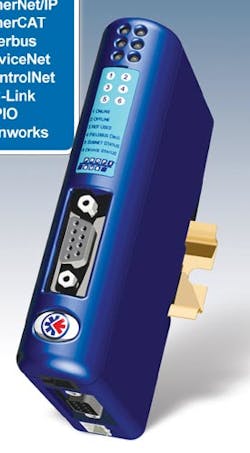When Genzyme (www.genzyme.com), a Cambridge, Mass.-based company decided to build a new production facility to produce a selective immunosuppressant (a drug used to prevent and treat organ rejection during organ transplants), management wanted its complex production process to be automated as much as possible to reduce human error. This meant networking a battery of very mixed laboratory equipment that was not initially designed to communicate over industrial Ethernet or Profibus fieldbuses.
The company plans to invest 115 million euros to develop the new bioproduction site in Lyon, France. “Genzyme is currently using labor-intensive production methods at [our] Sanofi Pasteur site in Marcy, [France]. With the new site, we’re hoping to optimize the process so as to reduce human error to the absolute minimum,” according to Alexis Ducancel, Genzyme´s automated systems officer.
Unlike traditional chemistry, production based on living cells involves many different complex and expensive stages. The production cycle for a recombinant protein requires an industrial infrastructure that is suited to large-scale production involving several stages staggered over several months. Each stage is subject to numerous quality controls. Tests to ensure the absence of viruses and contaminants are performed throughout the production cycle. At the end of the line, the purity and action of the protein are also checked.
Ducancel said the highly sequential batch process involves more than 780 individual production stages that can include “many sources of error.” Fully automating such a process “has required a lot of close work with the equipment involved when deciding how the system should behave,” he said. “This has avoided the need to re-think the entire ergonomics of the building and production equipment, whilst still resulting in a true revolution in the way the production process works. To achieve this, we specified more than 4,000 parameters and 13,000 alarms, enabling us to master every stage of production.”
Technicians, for example, can program in the settings for the centrifuges (speed, temperature, working time etc.) and these values can be changed in the Supervisory Control and Data Acquisition (SCADA) system to take the specific requirements of the current production batch into account. Readings are taken at every stage and sent back to the SCADA system, which “enables us to put a very precise traceability process in place,” said Ducancel. “In particular, this means that the workload for the quality assurance teams is significantly reduced, which is an advantage in cost terms.”
To enable consistent SCADA management across all the devices in use, Genzyme employs about 30 Anybus Communicator gateways from HMS Industrial Networks, a Swedish supplier of embedded network technology for automation devices, with U.S. headquarters in Chicago (www.anybus.com).
The Anybus Communicator series of gateways makes it possible to network devices that were developed for use in a serial network. The gateways can connect most products with an RS-232/422/485 serial interface to an industrial Ethernet or fieldbus. “We chose HMS because we felt that no other company has standard solutions available to return data from [our] very mixed set of equipment. We have 28 centrifuges, pH-meters, balances and so on, and the interface protocols vary,” he said.
About 50 employees are now in place at the Lyon site, where initial production batches are being run to validate the production process. Once certifications have been obtained, full production should start in late 2011and the total number of staff should then rise to 270.
Renee Robbins Bassett, [email protected], is Managing Editor of Automation World.
Genzyme (www.genzyme.com)
Anybus (www.anybus.com)
Subscribe to Automation World's RSS Feeds for Columns & DepartmentsAbout the Author
Renee Bassett
Managing Editor

Leaders relevant to this article:
